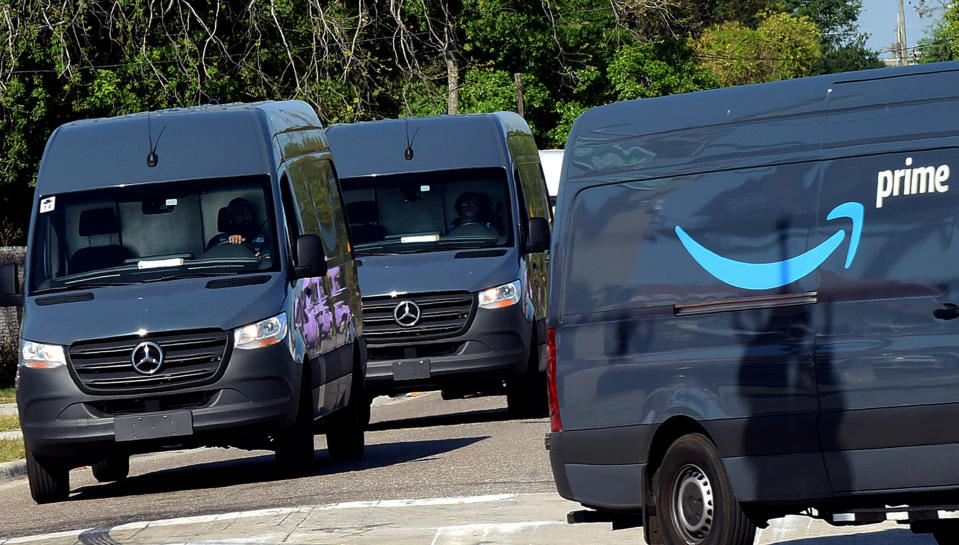Why Amazon could emerge from the coronavirus pandemic 'strongest,' according to a big-tech critic
As the novel coronavirus continues to spread through the U.S. population, forcing lockdowns across 30 states, Amazon, the world’s largest online retailer, is seeing a massive uptick in consumers hoping to ensure their cupboards are full.
The increase has spurred Amazon (AMZN) to hire an additional 100,000 workers to keep up with the demand, as Americans turn to the site for home essentials. And according to NYU Stern School of Business professor of marketing Scott Galloway, the greater reliance on Amazon will make it a far stronger company well after the coronavirus lockdowns come to an end.
“The company that probably comes out of this the strongest from a perception standpoint is Amazon,” Galloway, a critic of Big Tech and author of “The Four,” told Yahoo Finance’s “On The Move” last week.
“To their credit, they have shown incredible resilience. A lot of people who are dependent on Amazon are getting essentials within 48 hours. They have demonstrated decisive leadership.”
It’s not surprising that a service like Amazon would see increased demand at a time when users are locked in their homes. But the volume the company is facing now is especially heavy. Deliveries of nonessential goods deliveries, for instance, are backed up by months, if the products aren't completely sold out, such as Bounty paper towels and certain home gym equipment.
Prime’s 2-day delivery service has also taken a hit. The incredible volume of orders has forced the company to prioritize essentials, meaning that if you’re looking for 2-day delivery on anything else, you could wait as much as a month.
While Amazon might not be able to avoid all of Big Tech’s headaches, including accusations of price gouging among third-party sellers, the “everything store” has made some smart moves amid the global pandemic. For one thing, as Galloway pointed out, it limited the restocking of nonessential items to ensure that essentials are available for as many people as possible.
“There are a lot of people who are being supplied and replenished by Amazon,” Galloway said.

But according to Bank of America (BAC) analyst Justin Post, the fact that consumers are turning to Amazon for essentials doesn’t necessarily translate to better margins for the company.
Although Post predicts that Amazon’s sales will increase 23% year-over-year compared to prior expectations of a 21% increase, that could be offset by increased labor costs and cleaning efforts. The shift to low-margin essential items rather than high-margin discretionary goods like clothing could also hit Amazon in the near term.
That said, Post explains that the increase in grocery and consumer packaged goods will benefit Amazon in the long-term. Before that, though, the company will have to work through the cost inefficiencies created by the rapid shift in consumer demand for essentials.
Amazon’s AWS service could also see some short-term pain in Q2, as the economic damage caused by the pandemic may force companies to temporarily suspend capital expenditures on things like cloud computing.
The shift to the cloud, however, is inevitable for most firms, and once they are able to resume spending as normal, they’ll turn to the biggest names in the business. And Amazon is the biggest there is.
Other tech companies will take a hit
While Amazon has the chance to come out of the coronavirus pandemic stronger than before, that’s certainly not the case for other tech giants, according to Galloway.
Though Facebook (FB) and Google (GOOG, GOOGL), he said, could see their share of digital media advertising revenue jump from 64% to 70%, Facebook may end up hurt as a result of misinformation and fake news spread through its platform.
“No virus spreads faster than panic or fear,” Galloway said. “And a lot of the false information, and algorithms that love that false information because it results in more engagement, just thrive, if you will. It’s just a hot bed or a petri dish on Facebook. So Facebook and Google probably take the most heat, especially Facebook.”
Amazon, however, has also been struck by accusations of price gouging amid the pandemic. Attorneys general from 30 states sent a letter to Amazon CEO Jeff Bezos, as well as the heads of Facebook, eBay, and Craigslist, urging them to crack down on price gouging amid the pandemic.
Citing the Public Interest Research Group’s findings, the attorneys general said that more than half of the facemasks and hand sanitizers listed on Amazon saw their prices increase by 50%. What’s more, 1 in 6 of items sold directly through Amazon saw similar increases.
Amazon delisted most of those products, but was still warned by the states’ top law enforcement officers to ensure such practices are eliminated going forward.
The company has also faced criticism from its own workers, who are dealing with increased workloads due to the surge in demand from consumers. On Monday, employees at a Staten Island, NY warehouse staged a walkout, citing a need for the facility to be temporarily shut down and cleaned after a worker there tested positive for coronavirus.
So while Amazon is receiving increased recognition for its ability to help supply customers, it must still contend with the kind of criticism it has always faced.
More from Dan:
Microsoft renaming Office 365 to Microsoft 365, bringing Teams to everyone
The top 5 video chat apps to get your through the coronavirus lockdowns
How delivery apps like Uber Eats could keep the ‘most exposed’ small businesses afloat
Got a tip? Email Daniel Howley at danielphowley@protonmail.com or dhowley@yahoofinance.com, and follow him on Twitter at @DanielHowley.
Follow Yahoo Finance on Twitter, Facebook, Instagram, Flipboard, SmartNews, LinkedIn, YouTube, and reddit.


